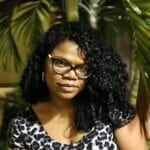What are the pressing issues that Black LGBTQ people in the US face today? The Black Census, released in May, has answers.
The Black Census is the largest survey of its kind conducted in the US since the Reconstruction era. Led by Black Futures Lab, which was established by Black Lives Matter co-founder Alicia Garza, it partnered with dozens of organizations around the country to survey more than 31,000 Black people. The purpose was to understand the values, beliefs and pressing legislative and policy priorities within Black communities—which are underrepresented in conventional surveys — in the hopes of creating a guide for 2020 presidential candidates.
The Black Census also studied how the intersecting factors of race, sexual orientation and homophobia affect Black people in the US. It surveyed more than 5,400 Black people who identify as lesbian, gay or bisexual, or who describe their sexual orientation as “other,” to put together its report, When the rainbow is not enough: LGB+ voices in the Black Census.
“Too often, Black LGB+ people are perceived as distinct and separate from the larger Black community,” the report states. “The Black Census revealed that, despite some differences, LGB+ Black Census respondents strongly identify with the Black community.”
A report on the experiences of Black trans and gender non-conforming people is forthcoming.
Here are some takeaways from the LGB+ Black Census.
Who identifies as LGB+?
Black LGB+ respondents were younger than heterosexual respondents: they were likely to be under 30 years old, while Black heterosexual respondents were more likely than LGB+ respondents to be 60 years old or over. This correlates with other studies that report that younger generations are more likely to identify as LGBTQ2.
Marriage and family life
Despite media portrayals of LGB+ people as overwhelmingly white and male, Black people have consistently been more likely than white people to identify as LGBTQ over the past seven years. This is also true for Latinx and Asian people.
Black same-sex couples are more likely to raise children than same-gender couples of any race or ethnicity.
A majority of Black heterosexual respondents support marriage equality.
Economic issues affecting Black LGB+ communities
Low wages are the biggest problem. Lack of affordable health care and lack of affordable housing were also identified as major concerns.
Both Black LGB+ and heterosexual respondents agree that the most pressing issue facing their own communities is economic. Black LGB+ people face higher unemployment rates and are more likely to experience economic hardship, than the rest of the population.
Black LGB+ people are more likely to have lower incomes than Black heterosexual Census respondents, despite both groups having similar education levels.
Bisexual respondents and those who identify as “other” are most likely to experience rising college costs.
Violence against Black LGB+ communities
More than 78 percent of Black LBG+ respondents say that violence against gay, lesbian and trans people is a problem, while 62 percent say it’s a major concern. Seventy-two percent of Black heterosexual respondents agree.
Black LGB+ respondents are among the strongest supporters of Black Lives Matter in all of the Black community, with 90 percent expressing a favourable opinion. Bisexual respondents are the most in support of BLM, followed by lesbians.
Black heterosexual respondents are also strong supporters of Black Lives Matter: 55 percent view BLM very favourably, and an additional 32 percent have a favourable view.
Police misconduct
Police misconduct is a major concern for both Black LGB+ and heterosexual respondents. This behaviour includes the killing of Black people by police officers, police not being held accountable for their crimes and excessive use of force by police officers.
Black LGB+ respondents are more likely than heterosexual respondents to have experienced a negative interaction with the police in the past six months.
People who identify as “other” were most likely to report a negative interaction with police, and to see police misconduct as a major problem while gay respondents were least likely.
Marriage equality
Lesbians are most likely to support marriage rights above all Black LGB+ groups.
Disrespect, harassment and violence
Black LGB+ respondents reported frequent experiences of disrespect and harassment in daily life.
Black LGB+ respondents, particularly bisexual people and people who identify as “other,” reported higher rates of disrespect than Black heterosexual respondents did, including experiencing discourteous behaviour a few times a month or more.
Black LGB+ respondents, particularly bisexual people and people who identify as “other,” are more likely than Black heterosexual respondents to feel threatened or harassed once a week or more.
You can read the full report here.


 Why you can trust Xtra
Why you can trust Xtra


